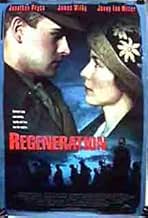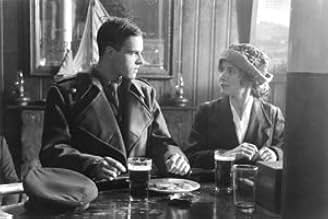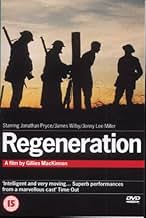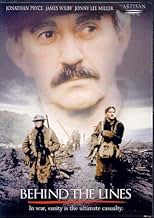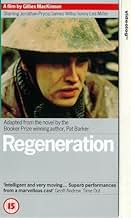IMDb RATING
7.0/10
2.6K
YOUR RATING
Based on Pat Barker's novel of the same name, "Regeneration" tells the story of soldiers of World War One sent to an asylum for emotional troubles. Two of those soldiers are England's most i... Read allBased on Pat Barker's novel of the same name, "Regeneration" tells the story of soldiers of World War One sent to an asylum for emotional troubles. Two of those soldiers are England's most important WW1 poets.Based on Pat Barker's novel of the same name, "Regeneration" tells the story of soldiers of World War One sent to an asylum for emotional troubles. Two of those soldiers are England's most important WW1 poets.
- Nominated for 1 BAFTA Award
- 17 nominations total
- Director
- Writers
- All cast & crew
- Production, box office & more at IMDbPro
Featured reviews
10Emily-98
For me, this film was, in a quiet, deeply felt way, much more powerful overall than "Saving Private Ryan," to which everyone seems to feel they must compare it (although regardless of one's opinion about their comparative merits, it is a false analogy in some ways because "Regeneration" is a WWI movie and addresses very different questions). While the first 20 minutes of "Saving Private Ryan" are stunning and their impact incredible, after that it becomes a rather disappointingly conventional war movie.
"Regeneration" is different. It is not with graphically real blood spilled, but rather with powerfully wrenching emotion and with poetry that this film drives home what war does to the men (and women) caught up in its sweep. The film's use of the poems of Siegfried Sassoon and Wilfred Owen is stunning, and while perhaps even more of their incredible poetry could have been employed in the film, the ones the filmmaker employs are carefully and perfectly chosen.
This is a war movie because its focus is on the war's destruction of men. But do not go into this film expecting the action of the battlefield to play out on the screen. There are a few scenes from the fields of France, powerful and well-placed in the film. And throughout the movie, you can just hear the dull thudding of shells, as if from a great distance - a striking reminder of how physical distance does not mean emotional distance. But if you are interested in the emotional impact those shells had, in an examination of the struggle to recover from that impact, (through poetry, through love, and through therapy), and in the moral questions raised by war, this is a stunning, deeply moving film you will not soon forget.
"Regeneration" is different. It is not with graphically real blood spilled, but rather with powerfully wrenching emotion and with poetry that this film drives home what war does to the men (and women) caught up in its sweep. The film's use of the poems of Siegfried Sassoon and Wilfred Owen is stunning, and while perhaps even more of their incredible poetry could have been employed in the film, the ones the filmmaker employs are carefully and perfectly chosen.
This is a war movie because its focus is on the war's destruction of men. But do not go into this film expecting the action of the battlefield to play out on the screen. There are a few scenes from the fields of France, powerful and well-placed in the film. And throughout the movie, you can just hear the dull thudding of shells, as if from a great distance - a striking reminder of how physical distance does not mean emotional distance. But if you are interested in the emotional impact those shells had, in an examination of the struggle to recover from that impact, (through poetry, through love, and through therapy), and in the moral questions raised by war, this is a stunning, deeply moving film you will not soon forget.
Regeneration is an amazing film, it discusses the unseen wounds left on soldiers by war. The emotional trauma it causes them and how best we can help them, if we can at all.
James Wilby gives a remarkable performance as an officer who is sickened by the war that he sees around him. He isn't so much mentally ill as disgusted with war and his contribution in it. Jonny Lee Miller is also amazing in his portrayal of an officer driven mute. When he discovers his voice he is angry and argumentative, but slowly we discover that all of his anger is a shell to protect the hurt that has built up inside of him.
One of the biggest underlying themes in this film is how useless war is, even if it is for the right cause. Mainly because it destroys the human psyche and removes hope.
This is a startling film, and touching and emotional. It cuts to the core of who we all are, as human beings.
James Wilby gives a remarkable performance as an officer who is sickened by the war that he sees around him. He isn't so much mentally ill as disgusted with war and his contribution in it. Jonny Lee Miller is also amazing in his portrayal of an officer driven mute. When he discovers his voice he is angry and argumentative, but slowly we discover that all of his anger is a shell to protect the hurt that has built up inside of him.
One of the biggest underlying themes in this film is how useless war is, even if it is for the right cause. Mainly because it destroys the human psyche and removes hope.
This is a startling film, and touching and emotional. It cuts to the core of who we all are, as human beings.
This was an excellent movie. Amazing photography and casting and an
intelligent scenario which passes messages about how horrific war is
to the audience in the mildest yet touching way I've seen.
The story involves a hospital in Scotland where officers are sent when
they suffer a breakdown, a common phenomenon in the first and second
world wars. In there, a doctor (played by Jonathan Pryce) attempts to
treat his patients in a more humane way than the one other doctors of
the time choose. Through the stories of characters in the hospital --
including Siegfried Sassoon and Wilfred Owen, two poets who happen to
meet and become friends in the hospital -- the life of the British
soldiers in the first World War, as well as several political messages
about that affecting era for humanity are successfully transmitted to
the audience, without blood, without effects or huge battle scenes in
a way that touches and indicates its significance more than any other
film I've seen about the subject.
The performances are excellent, with Johny Lee Miller -- who apart
from this movie has not shown any signs of serious acting that I've
seen -- delivering a very good performance of a shocked and ambitious
officer and Jonathan Pryce metaphorically accepting the ideas of
Sassoon -- who opposes to the war after a point where he realises its
futility and the lack of values in the politicians driving it -- can
be though as the link between the soldiers and humanity itself.
It is definitely a movie I would recommend! Excellent.
intelligent scenario which passes messages about how horrific war is
to the audience in the mildest yet touching way I've seen.
The story involves a hospital in Scotland where officers are sent when
they suffer a breakdown, a common phenomenon in the first and second
world wars. In there, a doctor (played by Jonathan Pryce) attempts to
treat his patients in a more humane way than the one other doctors of
the time choose. Through the stories of characters in the hospital --
including Siegfried Sassoon and Wilfred Owen, two poets who happen to
meet and become friends in the hospital -- the life of the British
soldiers in the first World War, as well as several political messages
about that affecting era for humanity are successfully transmitted to
the audience, without blood, without effects or huge battle scenes in
a way that touches and indicates its significance more than any other
film I've seen about the subject.
The performances are excellent, with Johny Lee Miller -- who apart
from this movie has not shown any signs of serious acting that I've
seen -- delivering a very good performance of a shocked and ambitious
officer and Jonathan Pryce metaphorically accepting the ideas of
Sassoon -- who opposes to the war after a point where he realises its
futility and the lack of values in the politicians driving it -- can
be though as the link between the soldiers and humanity itself.
It is definitely a movie I would recommend! Excellent.
The film opens with a stunning tracking shot that reminded me of Tarkovsky; the technique is used again throughout the film to register the horror of war--the mud, the dead, and the shattered, flailing bodies. Most of the film, however, takes place in an insane asylum, far from the battlefield. Yes, the film is quite "talky," but the talk is very good, very intelligent, very thought-provoking. The film focuses on a number of relationships that develop--principally, the respectful but antagonistic "father-son" relationship between the famous war hero and poet Siegfried Sassoon (who has been sent to the insane asylum for penning an anti-war statement) and Dr. Rivers (whose mission is to get Sassoon to recant and back on the front lines). But other relationships are almost equally important--those between Dr. Rivers and an angry soldier named Billy Prior, between Prior and a local "munitionette," and between Sassoon and the man who would emerge, under his tutorship, as perhaps an even greater war poet, Wilfred Owen.
The drama is based on real events, and the performances are quite stunning. Above all, Jonathan Pryce as Dr. Rivers is simply incredible, a man torn between duty and compassion, a doctor on the verge of becoming a patient himself. In a just world, he would have won an Oscar (but hardly anyone, it seems, saw this film on initial release). The handsome James Wilby gives a very fine performance as Sassoon--in fact, I've never seen him in better form. Johnny Lee Miller perfectly embodies the edgy anger, angst, and shame of Billy Prior. And Stuart Bunce brings a remarkably gentle, otherworldly quality to his haunting portrayal of Wilfred Owen. You absolutely believe that this man has a poet's soul; but he finds his voice not by contemplating beauty but by contemplating supreme horror.
There are many scenes from this film I will never forget--particularly, Dr. Rivers' trip to see another doctor cure a patient of being mute by applying electricity directly to his teeth and larynx. This scene is horrifying and, yet, like the rest of the film, restrained, in part because of the way Pryce portrays Rivers' reactions. Another unforgettable scene is the abrupt, shattering ending--but I won't give that away. Suffice it to say that words, especially the words of a great poet, sometimes are more powerful than shocking images.
This is a very intelligent, moving, humane, and important film. What a shame that it has been so overlooked.
The drama is based on real events, and the performances are quite stunning. Above all, Jonathan Pryce as Dr. Rivers is simply incredible, a man torn between duty and compassion, a doctor on the verge of becoming a patient himself. In a just world, he would have won an Oscar (but hardly anyone, it seems, saw this film on initial release). The handsome James Wilby gives a very fine performance as Sassoon--in fact, I've never seen him in better form. Johnny Lee Miller perfectly embodies the edgy anger, angst, and shame of Billy Prior. And Stuart Bunce brings a remarkably gentle, otherworldly quality to his haunting portrayal of Wilfred Owen. You absolutely believe that this man has a poet's soul; but he finds his voice not by contemplating beauty but by contemplating supreme horror.
There are many scenes from this film I will never forget--particularly, Dr. Rivers' trip to see another doctor cure a patient of being mute by applying electricity directly to his teeth and larynx. This scene is horrifying and, yet, like the rest of the film, restrained, in part because of the way Pryce portrays Rivers' reactions. Another unforgettable scene is the abrupt, shattering ending--but I won't give that away. Suffice it to say that words, especially the words of a great poet, sometimes are more powerful than shocking images.
This is a very intelligent, moving, humane, and important film. What a shame that it has been so overlooked.
Beginning with a fluid bird-eye-view shot tracking across the corpse-strewn muddy trenches of First World War Northern France, we are introduced to the character of the real-life war-poet Siegfried Sassoon (James Wilby), as he is shipped home and placed in Craiglockhart, a castle in Scotland being used as a military-run psychiatric hospital for soldiers suffering from war-neuroses. Sassoon's particular neurosis is little more than a conscious objection to the direction in which the war has turned in it's latter stages (1917), bringing him into conflict with the British military establishment (who had previously awarded him a Military Cross for bravery), and in particular psychiatrist Dr William Rivers (the ever reliable Jonathan Pryce), who is charged with the task of treating the various traumatised soldiers under his domain.
Taking a rather different approach from the 'war-is-hell' mass-entertainment spectacle of Spielberg's recent 'Saving Private Ryan' and Terence Malick's elliptical 'The Thin Red Line' (both made in 1998), 'Regeneration' evades easy solutions and focuses on the psychological horrors of war in a more low-key and balanced manner. The horrific battle scenes are largely eluded to in flashback, invoked during the well-meaning Pryce's therapy sessions, which utilise the entire arsenal of early Freudian psychotherapy, from dream-analysis to hypnotism as well as more quirky techniques such as putting shell-shocked officers in charge of troops of boy scouts in order to help them regain confidence in their leadership abilities. The central perplexity here is that the soldiers are being cured with the intention of sending them straight back to the front line.
With this and his following film, 'Hideous Kinky', Gillies MacKinnon is emerging as one of the most thought-provoking and technically accomplished British directors working at the moment, adopting an expressionistic cinematic style here which utilises the dark forbidding milieu of the hospital and the surrounding bleak, autumnal countryside to full claustrophobic effect. There are problems here, in the way that the script concentrates on a number of patients, including an angst-ridden Jonny Lee Miller (in his first post-Trainspotting role) who begins the film mute, without fully exploring the relationships between them, but it successfully establishes itself within a convincing historical context whilst challenging the proposition that Britain was united in its conviction to the First World War (of particular relevance today, given our involvement in the bombings of Kosovo and Iraq). Whilst not immediately accessible, it is a film that demands and rewards the closest of attention, and bodes well for future films from the director. Based on the 'Regeneration' trilogy of novels by Pat Barker.
Taking a rather different approach from the 'war-is-hell' mass-entertainment spectacle of Spielberg's recent 'Saving Private Ryan' and Terence Malick's elliptical 'The Thin Red Line' (both made in 1998), 'Regeneration' evades easy solutions and focuses on the psychological horrors of war in a more low-key and balanced manner. The horrific battle scenes are largely eluded to in flashback, invoked during the well-meaning Pryce's therapy sessions, which utilise the entire arsenal of early Freudian psychotherapy, from dream-analysis to hypnotism as well as more quirky techniques such as putting shell-shocked officers in charge of troops of boy scouts in order to help them regain confidence in their leadership abilities. The central perplexity here is that the soldiers are being cured with the intention of sending them straight back to the front line.
With this and his following film, 'Hideous Kinky', Gillies MacKinnon is emerging as one of the most thought-provoking and technically accomplished British directors working at the moment, adopting an expressionistic cinematic style here which utilises the dark forbidding milieu of the hospital and the surrounding bleak, autumnal countryside to full claustrophobic effect. There are problems here, in the way that the script concentrates on a number of patients, including an angst-ridden Jonny Lee Miller (in his first post-Trainspotting role) who begins the film mute, without fully exploring the relationships between them, but it successfully establishes itself within a convincing historical context whilst challenging the proposition that Britain was united in its conviction to the First World War (of particular relevance today, given our involvement in the bombings of Kosovo and Iraq). Whilst not immediately accessible, it is a film that demands and rewards the closest of attention, and bodes well for future films from the director. Based on the 'Regeneration' trilogy of novels by Pat Barker.
Did you know
- TriviaThe film used a lot of present and former Territorial Army soldiers as extras for larger scenes. This includes soldiers from 52nd Lowland, 6th Battalion Royal Regiment of Scotland, located in Hotspur street, Glasgow.
- GoofsThe camera and the crane on which it is suspended are reflected in several puddles during the very opening shot (of the battlefield).
- Quotes
Capt. William Rivers: I find it interesting that you don't stutter.
Billy Prior: I find it even more interesting that you do.
- Alternate versionsReleased in the USA in a 96 minute version under the title "Behind the Lines".
- ConnectionsFeatured in The 100 Greatest War Films (2005)
- SoundtracksJust Before The Battle, Mother
Words and Music by George Frederick Root (As G.F. Root)
Performed by Craig Titus
- How long is Regeneration?Powered by Alexa
Details
- Release date
- Countries of origin
- Language
- Also known as
- Krigets dårar
- Filming locations
- Overtoun House, Dumbarton, West Dunbartonshire, Scotland, UK(Craiglockhart Hospital)
- Production companies
- See more company credits at IMDbPro
Box office
- Gross US & Canada
- $33,131
- Opening weekend US & Canada
- $19,593
- Aug 16, 1998
- Gross worldwide
- $33,131
Contribute to this page
Suggest an edit or add missing content


